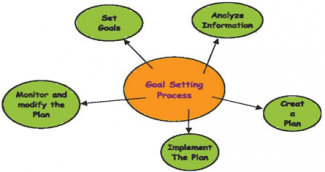“You are eating breakfast with your family. Your daughter knocks over a cup of coffee onto your business shirt. You curse. You harshly scold your daughter for knocking the cup over. She breaks down in tears. After scolding her, you turn to your spouse and criticize her for placing the cup too close to the edge of the table.
A short verbal battle follows.
You storm upstairs and change your shirt. Back downstairs, you find your daughter has been too busy crying to finish breakfast and get ready for school. She misses the bus. Your spouse must leave immediately for work. You rush to the car and drive your daughter to school. Because you are late, you drive 40 miles an hour in a 30 mph speed limit. After a 15-minute delay and throwing $60 traffic fine away, you arrive at school. Your daughter runs into the building without saying goodbye. After arriving at the office 20 minutes late, you find you forgot your briefcase. Your day has started terrible. As it continues, it seems to get worse and worse. You look forward to coming home, When you arrive home, you find small wedge in your relationship with your spouse and daughter.
Why? Because of how you reacted in the morning.”
Now this is the problem with most of us. Whenever, there is any stimulus, we immediately react. And most of the time this reaction is the culprit for our day to day woes. The above story is narrated by Stephen R. Covey, an internationally respected leadership authority, family expert, teacher, organizational consultant, and author as part of his 90/10 principle. You really do not have any control over 10% of what happens to you or in your surroundings. The other 90% is determined by your reaction and this is under your control.
Let us see what could have been the other scenario in the story just narrated above. You had no control over what happened with the coffee. How you reacted in those 5 seconds is what caused your bad day. Here is what could have and should have happened.
“Coffee splashes over you. Your daughter is about to cry. You gently say," It's ok honey, you just need, to be more careful next time". Grabbing a towel you rush upstairs. After grabbing a new shirt and your briefcase, you come back down in time to look through the window and see your child getting on the bus. She turns and waves. You arrive your office just in time and cheerfully greet the staff. Your boss comments on how good the day you are having. Notice the difference? Two different scenarios.
Both started the same. Both ended different.
Why? Because of how you Reacted.”
So now on wards, let us resolve that we shall not react at all. However, we shall definitely respond. You can’t be passive. You may ignore sometimes even the undesirable actions of others towards you. But when some trouble maker keeps creating problems, you can’t be a dumb spectator. I don’t agree with the philosophy that if someone slaps you on one cheek, offer the other one too to him. This may work with gentlemen but not with those who even don’t deserve to be called normal human beings.
So what do we do? Whenever, there is a stimulus that means some undesirable action by someone that deserves to be suitably replied. You must respond in an appropriate manner but definitely not react. Remember, reaction is instantaneous. While in case of response, you evaluate why the other person behaved in a particular way. You may conclude that the so called behaviour of the other person was in response to some action by you in the past. And if you put yourself in the shoes of the other person, you may realise that you might have behaved exactly in the same way. So the response means, you think of various options as to how you should reply back. You evaluate consequences of each option and then decide the final response and its timing.
There are some people who by nature explode with a very very minor trigger. They are considered to be having a fuse of very low rating. By habit, they react instantaneously. People at times make fool of them and take advantage by making them lose their temper and actually trap them to make blunders. So if any of the reader feels that she or he has the habit of reacting instantaneously, please pause and decide now itself that you shall change your behaviour. And now on wards shall never react, but respond.
I know a number of people whose family life was shattered due to such reactive behaviour. And also some very promising young professionals who couldn’t do well in the corporate world as they reacted in haste even to the feedback given by their team leader though it was actually for their good in the long run.
Let me take the example of appropriate response vs reaction at a higher level. In end March, 1971, the Pakistan Army ordered its tanks to take positions on the streets of Dhaka. The influx of refugees from then East Pakistan to India started in very large numbers. Then Prime Minister Indira Gandhi wanted General Manekshaw to attack Pakistan immediately as a reaction. But General Manekshaw was a seasoned soldier with in depth knowledge of the terrain and tributaries of East Pakistan. He told the PM point blank to leave the timimg of the response and the strategy to the armed forces. The world knows the outcome how Indian Forces decisively defeated Pakistan and the biggest surrender of Pakistan army took place with 90,000 plus sodiers surrendering with their arms and ammunition. And a new country appeared on the face of global map in the form of Bangladesh.
In the recent past, the revenge of Paki terrorists’Pulwama attack was also taken not as a reaction but as a highly planned response in the form of air strike at Balakot with extensive damage to the terror launching pads inside Pakistan including about 300 casulties. The surgical strikes at Uri & Balakot are examples of decisive firm responses by India to terrorist attacks by Pakistan.
Great leaders, great business men, great army commanders and great administrators understand the problems associated with reactive behaviour. Sometimes, their subordinates become restless as to the inaction by their boss. But in actual practice, the boss is working on various alternatives of responses and for the actual timing of striking back.



















